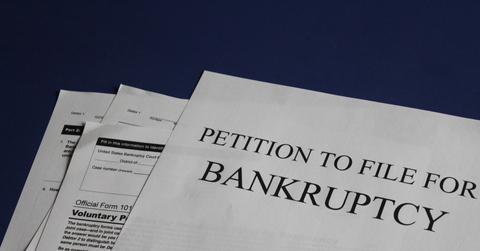Here's What Happens When You File for Bankruptcy
Bankruptcy might be your last resort if you have overwhelming debt. What happens if you file for bankruptcy?
July 11 2022, Published 6:17 a.m. ET

Filing for bankruptcy might seem scary, but if you can't pay your debt, it might be your last resort. What happens if you file for bankruptcy?
According to Debt.org, “Bankruptcy is a court proceeding in which a judge and court trustee examine the assets and liabilities of individuals, partnerships and businesses whose debts have become so overwhelming they don’t believe they can pay them.” In 2019, 774,940 bankruptcy cases were filed, and 97 percent of them (752,160) were filed by individuals.
When should a person declare bankruptcy?
If you have debt that you can’t realistically pay on your own, you're running behind on all or most of your loans, or you're being chased around by debt collectors, it might be time to think about filing for bankruptcy.

There are pros and cons to consider, however. Bankruptcy lets you organize and eliminate your debt, saves your home, and relieves you of creditors, but it also stays on your credit report for 7 to 10 years. This hampers your ability to borrow and can even make job seeking difficult.
Types of bankruptcies you can file
There are two common types of personal bankruptcies: Chapter 7 and Chapter 13. Most people file for Chapter 7 bankruptcy, also known as liquidation bankruptcy. Under this, some of your assets are sold to satisfy at least a portion of what you owe. However, the specifics depend on state law. Some states exempt your retirement accounts, house, and car from liquidation.
Under Chapter 13 bankruptcy, no property is sold to satisfy your debt, but your debt is reorganized so that you can partially pay off your debt over the next three to five years. If you don't comply with the payment plan, your creditors might be given the right to go after your assets. Chapter 7 bankruptcy can stay on your report for 10 years, and Chapter 13 for seven years.
How to file for bankruptcy
You can file bankruptcy on your own or through a bankruptcy lawyer. It's a slightly complicated process to compile and list your debt, assets, income, and expenses.
You’ll have to go through bankruptcy counseling, decide what type of bankruptcy to file, and then file a petition. Next, your case will be assigned to a bankruptcy trustee, who sets up a meeting with your creditors.
